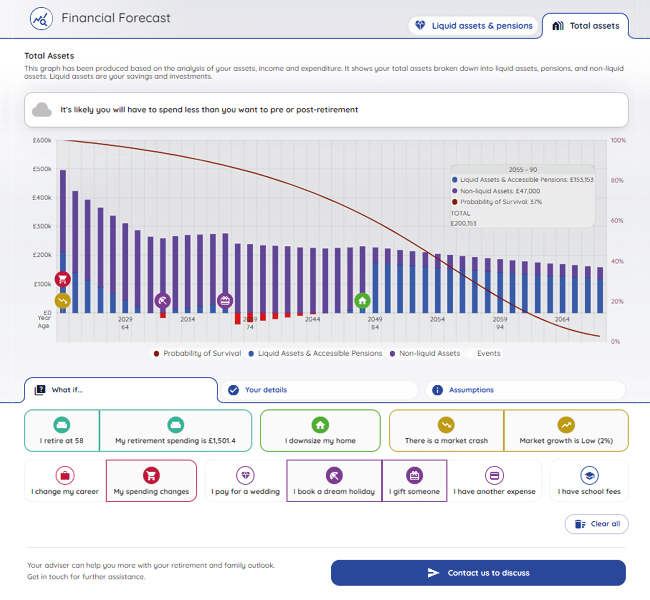Supporting business success through better use of client data
Richard Wake, Chief Customer Officer of intelliflo

Personalisation has become a hot topic. Many of the companies we interact with in different areas of our lives are using our data to better understand our individual needs, preferences and interests.
From your local restaurant sending you a money-off voucher on your birthday, to Spotify providing tailored song recommendations and Alexa giving different information depending on who it is talking to, the data companies hold on us can help deliver a more personalised and engaged experience, which in turn encourages greater customer loyalty.
Although using personal data has long been central to delivering suitable advice to clients, many firms are not yet making full use of the first-person data they hold to deliver a broader personalised experience for clients.

Collecting the data
Part of the problem is that data is often recorded and held in different systems, so extracting it to use in a meaningful way can be a challenge.
Firms also worry that their data may not be entirely accurate, so do not want to rely on it to provide more detailed insight into their client base.
Having a practice management solution that allows information to be recorded once and then stored centrally as a ‘universal source of truth’ that flows through other integrated systems is crucial.
However, for many firms cleaning existing data will also be vital to fully unlock the value of your data.
This is well worth doing to ensure you are only keeping data you have a legitimate reason to retain – important from both a cost and a regulatory standpoint – and to deliver efficiencies within the advice process, where sharing information between systems requires accuracy and consistency.

Technology can help with the clean-up operation, by highlighting client records that have key information missing and allowing corrections or updates in bulk as well as individually.
With data transparency becoming the norm in other sectors, including in DIY investing where self-directed customers already have ready access to current and historical valuations, performance, asset allocation and holdings and more, advised clients increasingly expect their adviser and providers to offer the same access.
This is easy to do via a secure online portal, which also allows clients to respond to requests and sign documentation at a time that suits them, speeding up transactions and saving time on administration and dealing with simple queries.
Greater client access
People are becoming much more aware of how their data is being used and stored, so the secure nature of a portal, which requires a login to view information rather than it being exchanged by post or email, provides reassurance that only those who justifiably need access have access.
Offering clients access to their personal details via a portal can also support the data-gathering process.
Allowing clients to update certain parts of their records – with a complete audit trail – helps ensure the information is accurate and up to date, and can also encourage greater information sharing.

For instance, many clients choose to link their bank account via open banking, which gives you a more detailed picture of their spending habits and identifies held-away assets to support fully holistic, personalised advice.
We believe that providing clients with greater access to their own data helps improve overall engagement with the advice process.
We know from adviser feedback that clients really love seeing their own data brought to life through cash flow modelling.
By adding the client’s more granular financial data, you can also use modelling to demonstrate the benefits of making specific changes, for instance to their current spending habits or by using held-away assets more efficiently.

To help firms provide greater data transparency to clients, we have made simplified cash flow modelling functionality available in the intelliflo personal finance portal.
This allows advised clients to look at different financial forecasts at their leisure, using their individual information to clarify the plan and create simple, interactive graphs around a range of ‘what if’ options to help understand the possibilities before talking to their adviser.
This functionality also reminds clients to provide any missing data, helping ensure the conversations you have with them are based on a full picture of their finances.
Alongside the obvious benefits to clients, making effective use of data to provide management information can have a significant impact on a firm’s ability to fulfil regulatory requirements, improve efficiency and build scale.
Understanding your data can provide insights into the firm itself, the wider market and prospective as well as current clients, identifying efficiency gains, processes that are working well or need improvement, and areas for investment.
Here again technology can help, delivering standardised data-sets and reporting to demonstrate regulatory compliance and deliver business intelligence on clients and operations to inform management decisions.
Data is at the heart of the personalised experiences that customers increasingly expect from providers.
However, without the right tools to manage, analyse and securely share the information they hold, firms will struggle to fully unlock the valuable insights within their systems.
Using technology to make the best use of the data you hold will help you deliver more personalised client experiences, encouraging greater engagement and loyalty and supporting future business success.
This article was first published in FT Adviser on 8 March. Please find a link to the original piece here.